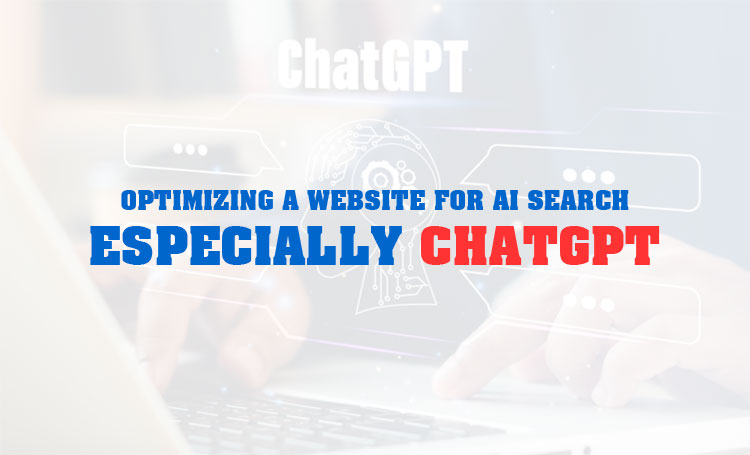How to Optimize a Website for AI Search, Especially ChatGPT?
- Explore AI-driven search trends with Viet SEO
- 1. Faster and More Accurate Information Retrieval
- 2. Prioritizing High-Quality Content
- 3. Contextual Search and User Intent Understanding
- 4. Voice and Image Search Integration
- How to Optimize a Website for AI Search, Especially ChatGPT?
- 1. Clear and Well-Organized Content Structure
- 2. Implement Structured Data (Schema Markup)
- 3. Optimize Page Speed
- 4. Ensure Accessibility and Mobile Optimization
- 5. Regularly Update and Refresh Content
- 6. Multi-Language Support
- 7. Provide an API for Data Access
- 8. Optimize for Featured Snippets
- 9. Contextual Relevance and Internal Linking
- 10. Monitor Performance and AI Search Visibility
- Conclusion
Explore AI-driven search trends with Viet SEO
In today’s digital landscape, artificial intelligence (AI) is changing how people search for information. Instead of just listing links, AI now analyzes, summarizes, and delivers direct answers from multiple sources. Tools like ChatGPT, Bard, and Bing AI are leading this trend, offering faster and more accurate search experiences. VietSEO agency helps businesses optimize their content to stay competitive in this era of intelligent search.
1. Faster and More Accurate Information Retrieval
Users now expect quick, precise, and easy-to-understand answers without having to browse through multiple websites. AI-powered search engines can aggregate and summarize content from various sources, providing detailed and contextually relevant responses. This raises the bar for website content optimization, ensuring accuracy and delivering real value to users. Businesses must adapt to this transformation to remain competitive.
- Direct answers instead of multiple search results
- Concise yet comprehensive summaries
For example, when asking, “How to optimize SEO?”, AI will provide a step-by-step guide rather than just a list of websites.
2. Prioritizing High-Quality Content
AI-driven search engines now favor:
- Well-structured content with clear headings
- Concise, easy-to-read, and well-organized information
- Accurate, up-to-date data
To optimize for AI, content should be presented in short, clear sections with subheadings and bullet points for better readability. Providing direct answers at the beginning of articles helps AI recognize valuable content, increasing its chances of being displayed in search results.
3. Contextual Search and User Intent Understanding
AI search engines go beyond keyword matching by understanding user intent (search intent). This enables them to:
- Provide responses that align closely with the query
- Adapt answers to the user's context, language, and even sentiment
For instance, if a user asks, “Where to buy quality furniture?”, AI will suggest specific brands or stores rather than just listing generic search results.
4. Voice and Image Search Integration
The rise of virtual assistants like Siri and Google Assistant has made voice search more common. Meanwhile, image-based searches are also gaining traction with:
- Google Lens and similar tools
- AI-powered image recognition for delivering relevant information
Websites should optimize alt text for images, provide clear video descriptions, and use structured metadata to help AI interpret multimedia content effectively. Additionally, optimizing multimedia files for faster loading enhances user experience and can significantly improve website ranking on search engines.
How to Optimize a Website for AI Search, Especially ChatGPT?
To ensure AI search engines effectively recognize and rank your website, focus on high-quality content with a clear structure and easy readability. Use structured data (Schema markup) to help AI process information more accurately. Additionally, improve page speed and mobile-friendliness to enhance user experience. Regular content updates and concise, direct answers to common questions will boost visibility in AI-driven searches. A professional Viet SEO service can support you in implementing these strategies to maximize your website’s performance in the AI era.
1. Clear and Well-Organized Content Structure
- Use proper headings (H1, H2, H3) to structure content effectively.
- Format information for readability with bullet points, tables, and short paragraphs.
- Provide direct answers at the beginning of each topic for AI to extract key information easily.
- Use natural language keywords that match common user queries (FAQ-style optimization).
2. Implement Structured Data (Schema Markup)
- Use Schema.org markup to help AI understand content types, such as:
- FAQ Schema for common questions
- Article Schema for blog posts
- Product Schema for eCommerce websites
- Structured data improves AI’s ability to extract relevant information for better search rankings.
3. Optimize Page Speed
- Use CDN (Content Delivery Network) to speed up content delivery.
- Compress images and optimize code (HTML, CSS, JavaScript) for faster loading.
- AI prioritizes fast-loading content for better user experience.
4. Ensure Accessibility and Mobile Optimization
- Content should be accessible on all devices, including for users with disabilities.
- Add alt text for images and ensure compatibility with screen readers.
- AI considers accessibility factors when ranking content.
5. Regularly Update and Refresh Content
- AI favors fresh, frequently updated content.
- Continuously add or modify information to keep it accurate and relevant.
6. Multi-Language Support
- Use hreflang tags to guide AI in recognizing multiple language versions of your content.
7. Provide an API for Data Access
- If you want AI tools like ChatGPT to pull structured data from your site, consider providing an API with clear documentation.
8. Optimize for Featured Snippets
- Include a concise summary (40-60 words) at the top of articles for AI to extract easily.
9. Contextual Relevance and Internal Linking
- Use internal links to help AI understand relationships between different pages.
- Provide context-rich answers tailored to user needs.
10. Monitor Performance and AI Search Visibility
- Test how your content appears on AI platforms like ChatGPT and Google Bard by asking related questions.
- Use Google Search Console and Bing Webmaster Tools to track indexing and crawling status.
Conclusion
Optimizing your website for AI search engines like ChatGPT and Google Bard ensures better content recognition and higher search visibility. These strategies, when applied with the expertise of VietSEO, also enhance SEO performance, boost organic traffic, and improve user experience.
By focusing on:
- Structured content with clear formatting
- Schema markup for better AI recognition
- Fast-loading pages for improved performance
- Direct, concise answers to common questions
- Mobile-friendliness and accessibility
Your website will be well-positioned to succeed in the age of intelligent search.



